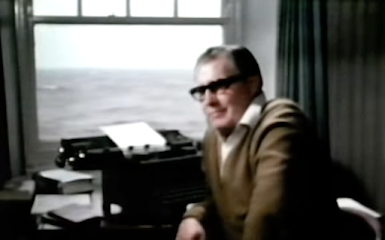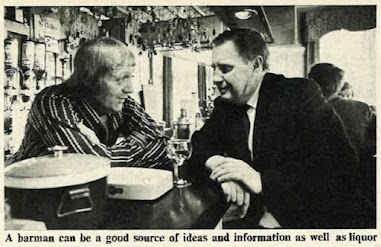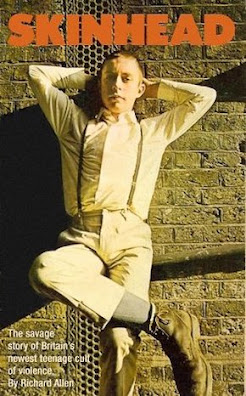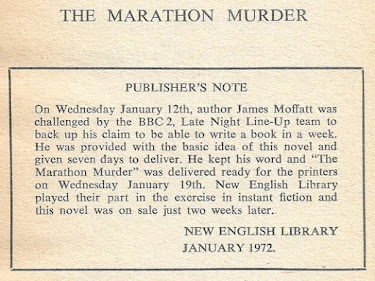The Marathon Murder
James Moffatt
London: New English Library, 1972
124 pages
James Moffatt
London: New English Library, 1972
124 pages
On January 12, 1972, Canadian writer James Moffatt appeared on BBC 2's Late Night Line-Up. The public broadcaster had a habit of wiping tape back then – most famously David Bowie's January 3, 1973 Top of the Pops performance of 'The Jean Genie' – but footage survives. At the time, Moffatt was the biggest paperback writer living in Britain. Skinhead was his greatest success.
Skinhead was published in 1970. By the time of his Late Night Line-Up appearance, Moffatt had followed it with Suedehead (1971) and Boot Boys (1972); Skinhead Escapades (1972), Skinhead Girls (1972), Top Gear Skin (1973), Trouble for Skinhead (1973), and many more followed, all published under "Richard Allen."
Moffatt once claimed that as a child he'd earned third prize in a Toronto Star short story competition. In one interview he spoke of studying law at Queen's, but in another he said it was chemistry. Moffatt talked about writing for pulps in New York, living in Hollywood, and being the publisher and editor of a bowling magazine.
Was any of this repeated on Late Night Line-Up? Segments of the 12 January1972 broadcast were used in the 1996 BBC2 documentary 'Skinhead Farewell,' but not enough to get a real handle on all that went down that night.
Because the episode itself hasn't been posted online, I rely on the publisher's note:
Added to this is Moffat's four-page author's note, in which he claims that The Marathon Murder began as a sort of spur of the moment thing with host Will Wyatt throwing out an an idea. "I had precisely five seconds in which to think of a title and write the first few sentences ON CAMERA!" writes Moffatt.
Here are those first few sentences:
Anyway, here's my fix:
Here are those first few sentences:
Munich was but two weeks away. This left Harry Nolan with two weeks solid training to get himself in shape. He had not been too keen of late to keep himself in shape because he had problems.It's not much of a start. This gruff Canadian, a self-described veteran of hard-boiled American pulps, writes: "Munich was but two weeks away" and "He had not been too keen of late to keep himself in shape." Reading these words, I'm almost surprised that Moffatt used "two weeks" and not "a fortnight."
Anyway, here's my fix:
Munich was two weeks away. This left Harry Nolan fourteen days to get in shape, but he had problems.
It may be that Moffatt was going after word count; his thirty-seven to my nineteen. New English Library describes The Marathon Murder as a novel, but at 38,000 words it is more accurately a novella. The low number surprises in that, when divided by seven, it amounts to fewer than 5400 words per day. Two months earlier, in a Daily Telegraph Magazine profile, Moffatt claimed ten thousand words as his daily output. He repeated that very same figure on the Late Night Line-Up appearance.
 |
| The writer at his desk. Late Night Line-Up, 12 January 1972 |
The Marathon Murder was written when the Olympic ideal of amateurism still held. Hero Harry Nolan, who ranks amongst the very best long distance runners on the planet, is an English office worker. His wife, Emily, has left him for another man. He worries that this will... um, affect his performance.
Terry Grayson is the other hero. A BBC journalist with no background in sport, for whatever reason he's been assigned to cover the marathon. Where Harry pines for Emily, Terry is stuck on some bird named Gloria. He just can't get over her, yet happily accepts leggy Sandra into his bed: "He had no illusions regarding their relationship. It was fleeting like fame. A fast, furious, fornicating union that had no basis in fact." Terry is surprised when Sandra follows him to Munich.
Terry Grayson is the other hero. A BBC journalist with no background in sport, for whatever reason he's been assigned to cover the marathon. Where Harry pines for Emily, Terry is stuck on some bird named Gloria. He just can't get over her, yet happily accepts leggy Sandra into his bed: "He had no illusions regarding their relationship. It was fleeting like fame. A fast, furious, fornicating union that had no basis in fact." Terry is surprised when Sandra follows him to Munich.
The Marathon Murder was written seven months before the start of the 1972 Olympic Games. It imagines violence, but in no way anticipates the actual horrors. At time of publication, Moffatt's likening the Olympic Village to a hastily constructed kibbutz would not have been chilling.
At some point in his Late Night Round-Up appearance Moffatt stands next to a New English Library spinner-rack."These are some of the 250 books I've written these past twenty years," he says. "During the last year I've written eight, nine books, due to the fact I haven't been too well." The words hint at his future. A drinker, Moffatt's addiction got the better of him. His final book, Mod Rule, appeared in 1980, after which he went silent. He died thirteen years later at the age of seventy-one.
 |
| James Moffatt (right) in the Daily Telegraph Magazine, 19 November 197 |
The Marathon Murder is no speedy read. A tough slog, it took me two weeks to reach the end.
I was outpaced by the author.
Trivia: Harry Nolan is a fan of James Bond and Silas Manners, the latter being a British spy who features in Moffatt's The Sleeping Bomb (1970) and Justice for a Dead Spy (1971).
Object and Access: A cheap mass market paperback, typical of its time, the last four pages are given over to other New English Library titles, including Skinhead, Suedehead, and Boot Boys.
I purchased my copy last October for £5.00 from a Lincolnshire bookseller. As of this writing, all of two copies are listed for sale online.
WorldCat suggests that no library, Canadian or otherwise, holds a copy.
Related posts:











Brian, Brian, Brian… this Moffatt dude’s literary excellence didn't just include the SKINHEAD books. He also gave the world private eye JOHNNY CANUCK, one quarter Sioux Indian and 100 per cent tough guy.
ReplyDeleteKevin, Time for Sleeping, "ANOTHER TENSE JOHNNY CANUCK THRILLER," has been on my TBR pile for three years or so, continually pushed down by newly purchased Moffatts. The most recent, The Courtyard, features perversion, orgies, adultery, wife-swapping, depravity, and corruption. At least that's what the cover copy promises.
Delete